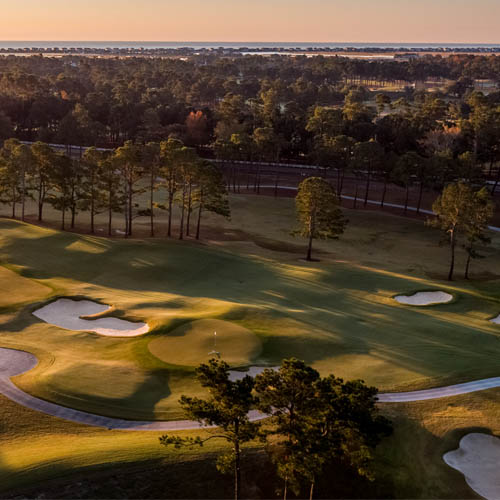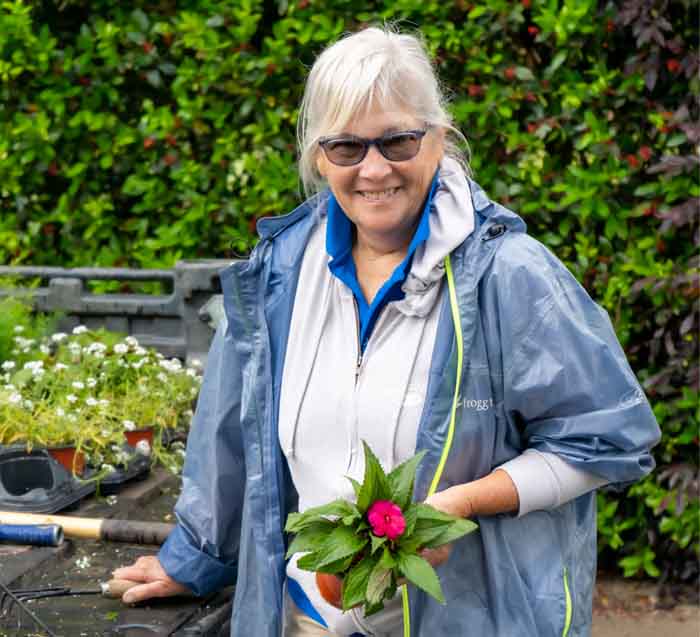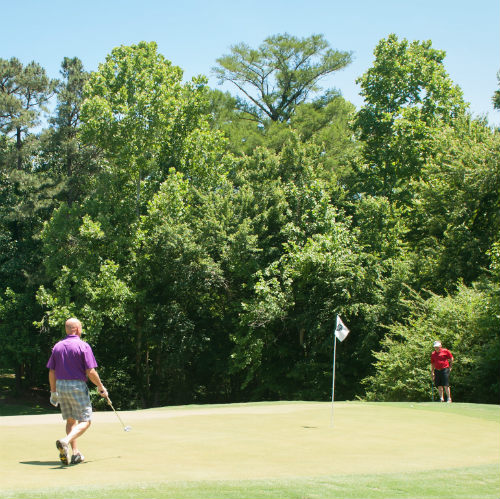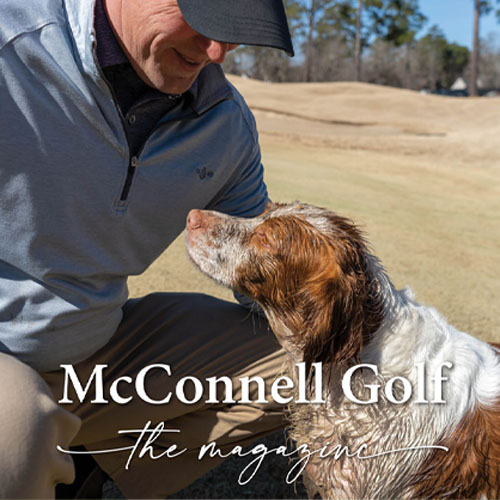
Quite often I find myself telling people, “I spend more time with my dog than I do my family.” I do not say it out of pride or in an attempt to slight my family, it’s just a statement of fact. I love my wife and kids. The time I spend with them is precious, but it’s tough to compete with the availability of Pepper. Pepper is my 7-year-old Brittany, and she comes to work with me at Brook Valley Country Club every day. She’s ready to roll first thing in the morning, she’s with me all day, and she sleeps on my bed at night. Pepper and I have a special relationship. However, we are not alone in the world of McConnell Golf as “working dogs” are more prevalent in our organization than you might realize.
As you may know, where there are geese on a golf course — there are people wishing they were gone. They are a nuisance to golfers and golf course maintenance personnel alike. Geese feed on insects and other invertebrates and cause a fair amount of destruction to turf in the process. In addition to the damage they cause from feeding, they tend to leave behind unwanted and messy “fertilizer.” Since they are a federally protected species, they are not easy to remove or relocate. What is legal and acceptable, without special permits, is what officials refer to as harassment. It’s exactly what it sounds like, keep them agitated and harassed until they decide to move on to another location. To accomplish this, some courses use green lasers, others use noise makers, or cutouts of coyotes and alligators. All these tactics are helpful, but nothing will harass a goose like a well-trained dog.
I cannot tell you about goose dogs without sharing how I started in the goose chasing business. My experience with dogs predates Pepper and McConnell Golf as my uncles were avid upland bird hunters, who loved quail hunting. Around the holidays every year, I would get the chance to go out in the field with them and be a part of the hunt. I loved to watch their Brittany Spaniels work a field.
The dogs would run hard at first in excitement, then they would settle down to a trot and get to work. They seemed to methodically divide the field up in sections where they knew quail had been and would keep checking back with us to make sure we were close. This was serious work for the dogs, and you could tell it was what they lived for as they loved the thrill of the hunt. Eventually, when they would wind a bird and lock up, every muscle in their bodies seemed to clinch as they went completely rigid, and their noses were pointing right where we could find the birds. They would stand like a statue until the birds were flushed. If you’ve never seen a pointing breed work, I assure you it is an impressive sight to see. A dance choreographer could not create more beautiful movements.
I will never forget those hunts with my uncles. One thing I did not realize at the time was how much I was learning to work with dogs. I was learning how a well-trained dog will work for you, how an untrained dog can be a liability, and how to trust a great dog’s nose and intuition. My uncles taught me how to treat a dog with respect and showed me a working dog can be a member of the family and still do their job. They also showed me a good dog needs a little discipline, a lot of consistency, and even more encouragement. I know all this now but back then, all I wanted was my very own Brittany.
It took some time for my working dog training role to take place. After getting a college education, a new bride, a cross country move, and a career change, I finally got my very own Brittany named Katie. From the time my wife and I picked her up as a puppy, not a moment was wasted. We did not have children yet, so Katie had our attention. For the first two years of her life, she and I spent 10 hours a week training. We went everywhere together and by the time she was 3 years old, Katie knew more than a dozen commands, and was becoming a force to be reckoned with in the bird field.
Katie would stay on point until I released her and would retrieve to hand, heel, wait for approval, and then go right back to hunting. The more we challenged her with new tasks, the more she delivered. She learned quickly how to retrieve from land or water, and she could track game, sit calmly in a blind and even open doors in our home.
When we got Katie, I was an assistant superintendent. Five years later, I was given the opportunity to step into a superintendent role. The course that hired me had a terrible goose problem, and guess who had a chance to learn a new skill? We added a few commands to Katie’s repertoire, and just like that, we had a goose dog! It took me and Katie nearly two years of harassing those geese every day, and then they were gone. They rarely came back, and if they did, Katie was on the job immediately.
Katie and I worked for four different golf courses throughout her life. During the winter months, we got paid to guide quail hunts at local hunting preserves. For two summers, a municipality hired us to chase geese out of a city park. She and I made a great team and when she was in her prime, we had so much fun. We learned a lot together on and off the course. However, sadly, her working days were over by the time she was almost 12. You could tell she was really slowing down, and that’s when she passed the torch to our new puppy, Pepper.
Other than making an appearance at training days with Pepper, Katie lived the last four years of her life in comfort. She spent most of her days holding down her bed in my office, or the couch at home. Before she left us in the spring of 2020, she was two weeks away from her 16th birthday. There are a lot of people who miss her, nobody more than me, but her spirit lives on. Some people even mistake Pepper for her. While they are the same breed and have similar markings, Pepper is not nearly as talented. However, to be fair, I have not put as much work into her training. She does mind her manners, knows a few commands, and chases geese for Brook Valley. Her specialty is snuggling with my wife and kids, and she loves the work!
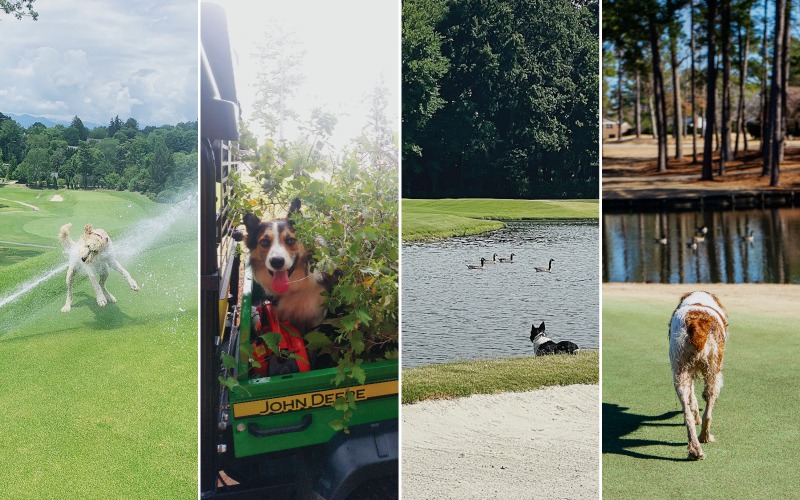
McConnell Golf’s canine program started at Raleigh Country Club in 2004 with a border collie named Quinn. We currently have three trained border collies that were purchased for geese chasing, and they are based at Porters Neck Country Club, Providence Country Club and The Country Club at Wakefield Plantation. In addition to Brook Valley, Country Club of Asheville has a family dog that is trained to help chase geese. “Not only are these dogs a great help with the geese, they help with morale of the superintendent and maintenance crews,” says Michael Shoun, vice president of agronomy at McConnell Golf. “What other job can you bring your best friend to work with you every day?”
Several of the McConnell Golf dogs came from a similar background to Pepper, and the ones I have met are amazing. The dogs all have a story, like Providence’s superintendent, Mark Scott. Scott’s 3-year-old Border Collie Sis herds geese away from the course. “One of our agronomy team’s greatest assets is Sis,” says Scott. “She loves to run and is always ready to work when she needs to. The geese don’t stand a chance because of how quick she is on the course. Sis really is a great dog, and the rest of the team likes having her around as well.”
Sis, like Chris Parham’s Border Collie Euro, was purchased from a company called Flyaway Geese out of Stanfield, North Carolina. Flyaway Geese breeds border collies to ethically and skillfully assist with geese removal nationwide. Euro’s first stop at a McConnell Golf course was Providence. “When I moved to Porters Neck, I asked if Euro could transfer as well,” says Parham. “He got the ‘OK’ to become a beach dog here in Wilmington. He loves chasing geese! When he’s not running through the sprinklers on the golf course, you can find him hanging out in my office or on our utility cart. He also loves to ride on the boat with my wife Lynn and I.”
One might say McConnell Golf has geese covered from the mountains to the coast as Will Laine, the assistant golf course superintendent at Asheville also has a canine assistant. Charlie, Laine’s 4-year-old Goldendoodle, has been at CCA for about a year. During the day, he enjoys greeting members on the course, and some of them even put treats in their golf bags for him or buy a snack for him at the turn. “He loves chasing geese off the No. 4 fairway, sticking his face in front of irrigation sprinklers, cooling off in the creek on No. 10 and playing in the snow,” says Laine. “Charlie can also locate moles underground and pull them out before they damage turf. Having him run the golf course with me every day is not only great for the course, but great for his health and the morale of our maintenance staff.”
Dogs have a way of bringing joy and comfort to most everyone around them. In the busy, hectic, and sometimes stressful life of a golf course superintendent, a dog can be a great companion. While they may not always have a busy season on the course, sometimes their job is to put a smile on someone’s face for a moment. For as long as I am a superintendent, whether there are geese to chase or not, I will always have a dog at my course. Mark Twain could not have said it better, “If there are no dogs in heaven, when I die, I want to go where they went.”
Read More
